Table of Contents
ToggleIntroduction
Are You Worried About Affiliate Compliance? Here is What I have Learned –
When I started exploring affiliate marketing I was eager to dive and start earning. But I quickly realized that without understanding compliance I was risking more than I thought. Affiliate compliance is not just a set of boring rules, it is what keeps your business safe and sustainable in the long run.
I learned that staying compliant means following clear guidelines to avoid legal trouble. For example, Federal Trade Commission (FTC) regulations require affiliates to disclose their relationships with brands. Ignoring this can lead to costly fines or even losing your business reputation.
This guide is my way of simplifying what I have learned. Whether you are a marketer or a business owner, understanding the basics of affiliate compliance will save you from a lot of headaches. Let us break it down so you can focus on growing your business while keeping yourself safe.

What Is Affiliate Compliance?
When I first heard about affiliate compliance it felt overwhelming. Legal rules, ethical guidelines, disclosures it all seemed too much. But as I dug deeper, I realized how critical it is for anyone in affiliate marketing. Without compliance you are not just risking penalties, you are putting your reputation and income on risk also.
Affiliate compliance is about playing fair. It ensures that everyone, businesses, affiliates and consumers stays protected. For instance, the FTC requires affiliates like me to clearly disclose when I earn a commission from a recommendation. Why? Because it keeps things transparent and builds trust.
I have learned that compliance is not just about avoiding trouble. It is about creating a space where all stakeholders, marketers, businesses and customers feel secure and respected. Staying compliant has allowed me to focus on my promotions confidently knowing I am building something sustainable and ethical.
Why Is Affiliate Compliance Important?
When I started affiliate marketing I did not fully grasp the weight of affiliate compliance. Honestly, I thought it was just “extra paperwork.” But I quickly realized how wrong I was. Failing to meet compliance standards is not a small oversight, it is a fast track to fines, legal trouble and losing partnerships.
For example, a fellow affiliate shared how non-compliance with FTC guidelines cost them thousands of fines. Hearing that hit me hard. I knew I could not afford to make the same mistake.
Following compliance rules may seem like a difficult task but for me, it has become second nature. It keeps my business ethical and sustainable while ensuring my audience feels confident in my recommendations. And that trust? It is priceless.
Key Regulations Governing Affiliate Compliance
I will be honest, when I first heard about affiliate compliance, I did not think much of it. I figured “How complicated can it be?” But once I dive in, the reality hit me. Skipping the rules is not an option if you want to stay in business. Some of the most critical rules governing affiliate compliance include –
- FTC Guidelines (Federal Trade Commission): They are not just suggestions, they are requirements. I learned that if I promote a product, I must clearly disclose my relationship with the brand. Ignoring this could mean fines or even losing my audience’s trust. A friend of mine actually had their affiliate account suspended for failing to add proper disclosures. It was a wake-up call.
- GDPR (General Data Protection Regulation): Since I occasionally target audiences in Europe, I had to rethink how I collect and use data. GDPR compliance is non-negotiable. It ensures I handle personal data responsibly. At first, setting up compliant processes felt like a hassle, but tools like cookie consent banners made it manageable.
- CAN-SPAM Act: If you are using email marketing, you need to follow strict rules – no misleading subject lines, always include an opt-out option and never send emails without consent. One mistake here and you are looking at costly fines. I now double check every email campaign to ensure compliance it is worth the effort.
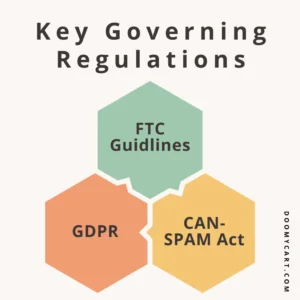
Want to read more about how these compliances affect affiliate marketing and how to be a Super Affiliate read my article “Super Affiliate Marketing 101- Key Steps to Earning Big“.
Best Practices for Staying Affiliate Compliant
When I first started, staying compliant felt overwhelming. Every time I thought I had it figured out, I would discover another rule I was breaking. It was frustrating but ignoring compliance is not an option, it is the backbone of doing this right.
- Disclose Affiliate Relationships: The first big step for me was disclosing affiliate links. I used to think a small disclaimer hidden at the bottom of my page was enough. Turns out, it was not. After some research (and a close call with a warning from a platform), I realized I needed to be upfront. Now I use clear statements like, “I may earn a commission if you purchase through this link.” It is straightforward, honest and builds trust.
- Use Accurate and Honest Marketing: Then there is honest marketing. At first I got caught up in trying to make products sound perfect. But I learned the hard way, making exaggerated claims can backfire. I saw one marketer get sued for promoting false results with a health product. If I recommend something I share my real experience or reference solid evidence.
- Stay Updated on Regulations: Regulations also keep evolving. I found this out when GDPR came into effect. At first I was clueless about how it applied to me, but I invested time in understanding it. Simple tools like cookie banners and privacy policies saved me a lot of headaches. Now I check for updates every few months to make sure I am not behind.
- Provide Clear Terms and Conditions: Lastly I never skip the details when sharing offers. One time I promoted a product without mentioning its subscription model and a follower felt misled. That was a wake up call. These days I clearly state costs, restrictions or any little details in the offer. Transparency avoids confusion and builds credibility.
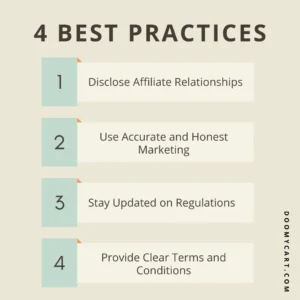
If you are feeling stuck with compliance, trust me, it gets easier. Once you make it a habit, it not only keeps you out of trouble but also strengthens your audience’s trust in you.
How to Disclose Affiliate Links Properly
When I started affiliate marketing I thought disclosing affiliate links was optional. I figured people did not really care. Big mistake. After diving into the FTC guidelines and nearly losing an affiliate partnership, I realized this is not just a formality. Here is how I turned things around –
- Placement: Firstly I fixed where I put my disclosures. At the start I would bury them at the bottom of my page thinking no one would notice. That is exactly the problem, no one did! Now I place them right where they matter, next to the link or at the very beginning of my content. It is impossible to miss and I have noticed it actually builds credibility with my audience.
- Clear Language: Second, I learned that how you word it makes a difference. I used to use vague phrases like, “This is sponsored content.” But the FTC made it clear that this is not enough. Now I say something direct like, “This is an affiliate link and I may earn a commission if you purchase.” It is simple, upfront and gets the job done. You can visit my “Affiliate Disclosure” page to get an idea about how it should be done.
- No Hidden Disclosures: I stopped hiding disclosures. I once thought putting them in my terms and conditions was enough. It was not. People do not dig through pages of text. Today my disclosures are always visible and easy to spot, no small print, no hidden links.
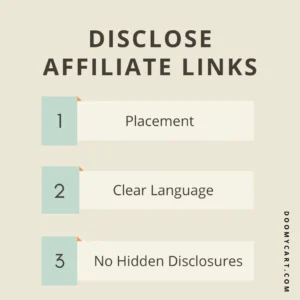
Common Affiliate Compliance Mistakes to Avoid
When I first got into affiliate marketing I thought affiliate compliance was just a box to check. But reality hit hard when I started seeing how even small mistakes could lead to big problems like lost partnerships, legal risks and worse than this is losing my audience’s trust. Here are the three mistakes I made and how I fixed them –
- Not Disclosing Affiliate Links: At first I did not bother with disclosures. I thought Why draw attention to the fact I am earning commissions? Then I realized it is a legal requirement under FTC guidelines. Now I always add a clear statement, like “This is an affiliate link and I may earn a commission if you purchase.” It is upfront, transparent and actually builds trust with readers.
- Overhyping Products: In my early days I let excitement take over. I would make claims like, “This will change your life overnight!” But the truth? It was not sustainable. People returned products, complained and I felt awful. Now I stick to honest reviews and real benefits. I learned that being truthful actually leads to repeat customers.
- Ignoring Local Laws: Targeting a global audience seemed exciting, but I did not think about the legal side. For example, when promoting to European customers, I was not GDPR compliant. That means I was not properly handling data or getting consent. After one warning email I knew I had to take it seriously. Now I use tools to manage compliance across regions like cookie banners.
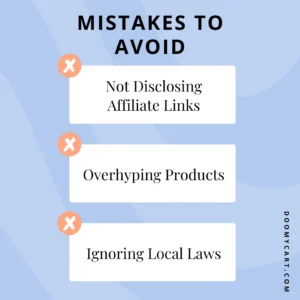
Mistakes happen, but they are not the end of the road. By staying honest, transparent and informed about local regulations I have built a business I am proud of and you can too.
The Role of Affiliate Networks in Compliance
At first I did not know where to begin or what rules applied to me. That is when I discovered the role affiliate networks play in simplifying the process.
The Problem
I found myself confused by ever changing regulations like FTC disclosures and GDPR. The fear of unintentionally violating the rules kept me second guessing my campaigns.
The Solution
Joining a reputable affiliate network changed everything. These networks act as the bridge between affiliates and merchants. They are much more than matchmakers. For example, one network I joined provided step by step guides on affiliate compliance including proper disclosure practices. Another required me to sign a compliance agreement and complete a quick training module. It was eye opening to see how they emphasized transparency and ethical practices.
The Result
By working with a network that prioritized compliance I felt more confident promoting offers. They even offered tools to track my campaigns and ensure I followed the rules. For instance, I learned how to position disclosures effectively and create GDPR-compliant in forms using templates they provided.
If you are new or unsure about affiliate compliance, partnering with a network that prioritizes education and support can save you a lot of headaches.
Consequences of Non-Compliance
When I first dive in I underestimated how important affiliate compliance was. I thought I could just focus on promoting products but I quickly learned how costly ignoring the rules could be.
The Wake Up Call
One incident stuck with me. A well known affiliate had their reputation ruined when their audience discovered misleading claims in their promotions. The trust they had worked years to build was gone and they struggled to recover. I did not want that to be me.
What I Learned
- Fines and Penalties: Agencies like the FTC do not take violations lightly. They can issue fines that wipe out profits or worse.
- Loss of Partnerships: Businesses do not want to work with rule breakers. One mistake could mean losing access to your most profitable partnerships.
- Reputation Damage: Trust is everything in affiliate marketing. Lose it and you will spend years trying to rebuild what was lost.
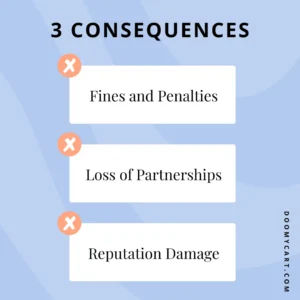
Compliance is not optional it is essential. I started taking it seriously, making sure every disclosure was clear and every campaign was above board. Honestly, doing things the right way did not just protect me, it made my audience trust me even more. Do not wait until it is too late to learn this lesson.
Conclusion
Affiliate compliance is not just a legal requirement, it is the foundation of trust and long-term success in affiliate marketing. By being transparent with disclosures like, “This is an affiliate link,” and ensuring all claims are truthful, I have seen how it strengthens relationships with both audiences and business partners. Staying informed about changes in guidelines such as FTC rules or GDPR has helped me avoid risks and operate confidently.
For me prioritizing honesty and compliance is not optional, it is what makes affiliate marketing sustainable. When you commit to these practices you not only protect your business but also build credibility that stands the test of time. Compliance is not a burden, it is the key to thriving ethically in this industry.
